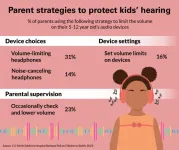(Press-News.org) The average researcher thinks they are better than their colleagues at following good research practice. They also think that their own research field is better than other research fields at following good research practice. This is shown in a new study by researchers at Linköping University, Sweden. The results point to a risk of becoming blind to one’s own shortcomings, according to the Linköping researchers.
“The starting point for the project is that there’s a bit of a crisis in the research world. Research misconduct or difficulties to replicate research results have been discovered in many studies. Credibility has been called into question,” says Gustav Tinghög, professor in economics at the Department of Management and Engineering.
Together with postdoc Lina Koppel and doctoral student Amanda Lindkvist, he sent a questionnaire to more than 33,000 Swedish researchers. The questions were based on the Swedish Research Council's rules for what constitutes good research practice. For example, researchers should always tell the truth about their research and always openly present the premises, methods and results of a study.
Participants were asked to answer two questions: How well do you think you follow good research practice compared to colleagues in the same research field? And how well do you think that your particular research field follows good research practice compared to other research fields?
The survey was sent to all researchers and doctoral students employed at Swedish universities. More than 11,000 responses were received. The answers were to be given on a seven-point scale where a four was equal to “the same as the average”. The results of the study have now been published in the journal Scientific Reports.
“It turns out that almost all researchers consider themselves as good as or better than average, which is a statistical impossibility,” notes Gustav Tinghög. “If everyone could look at themselves objectively, an even distribution around the middle would be expected.”
Most – 55 percent – stated that they were as good as most others at following good research practice. 44 percent thought they were better. Only 1 percent thought they were worse. On the question of practices in their own research field, 63 percent said that they were as good as most others, 29 percent that they were better and 8 percent that they were worse.
All research fields showed a similar overestimation of their own honesty, although the effect was greatest for researchers in medicine.
According to the Linköping researchers, the results show that researchers as a group often overestimate their own ethical behaviour. And this overestimation also extends to their own research field in general. The inaccuracies are very rarely of a scandalous nature, but more concern everyday procedures, how results are shared and data is reported.
“Small missteps can increase in number and perhaps become worse missteps,” says Amanda Lindkvist.
In addition to the risk of becoming blind to one’s own ethical shortcomings, the conviction that one’s own research field is better at research ethics compared to others can also contribute to polarisation in the research world. This complicates interdisciplinary collaboration between research fields, according to the Linköping researchers.
Of course, it cannot completely be ruled out that mostly highly ethical researchers responded, but it is less likely that this would affect the outcome of how the researchers view their own field of research, according to the researchers. Fundamentally, the study shows that researchers are not immune to psychological processes that affect all people, that is, our tendency to believe the best about ourselves and explain away what goes against our self-image.
“Every day, researchers face the dilemma: should I do what benefits me or should I do what benefits science. In such a world, it’s important to constantly look at yourself in the mirror and calibrate your research-ethical compass,” says Gustav Tinghög.
END
Researchers overestimate their own honesty
2024-02-26
ELSE PRESS RELEASES FROM THIS DATE:
Tattoo inks don’t match the ingredients listed on the bottle
2024-02-26
When you get a tattoo, do you know what you’re putting under your skin? According to new Binghamton University research, the ingredient labels on tattoo ink don’t match the actual substances in the bottle.
Produced by the lab of Binghamton Univerity Assistant Professor of Chemistry John Swierk, “What’s in my ink: An analysis of commercial tattoo ink on the U.S. market” was recently published in the journal Analytical Chemistry.
Swierk’s lab explores the potential impact of light on tattoos and their chemical breakdown. Early on, doctoral student Kelli Moseman ...
May I have a quick word? Study shows talking faster is linked to better brain health as we age
2024-02-26
As we get older, we may start to notice it takes us longer to find the right words. This can lead to concerns about cognitive decline and dementia.
However, a new study by Baycrest and the University of Toronto suggests that talking speed is a more important indicator of brain health than difficulty finding words, which appears to be a normal part of aging. This is one of the first studies to look at both differences in natural speech and brain health among healthy adults.
“Our results indicate that changes in general talking speed may reflect changes in the brain,” says Dr. Jed Meltzer, ...
Vanishing forests and suffering children: The hidden toll of deforestation in Cambodia
2024-02-26
Deforestation, a critical consequence of human activity, has garnered significant attention due to its impact on environmental sustainability, biodiversity and climate change. However, an equally pressing yet less explored aspect is the relationship between deforestation and human health, especially in impoverished regions. Scientists have increasingly recognized the detrimental effects of deforestation on various aspects of human health, particularly among children. Studies reveal that children residing in areas with high deforestation rates are at an elevated risk of malaria, ...
Birth outcomes improve in states that extend driver’s licenses to undocumented immigrants, research finds
2024-02-26
In 2023, Rhode Island, Massachusetts and Minnesota joined a growing list of states that allow undocumented immigrants to obtain driver’s licenses if an applicant can provide certain documentation, such as a foreign birth certificate or passport and evidence of current residency in the state. Altogether, 19 states and the District of Columbia have similar legislation in place. And lawmakers in other states, such as Michigan and Oklahoma, have introduced similar legislation.
In many cases, these laws were passed ...
First-in-humans discovery reveals brain chemicals at work influencing social behavior
2024-02-26
In a study in today’s (Monday Feb. 26) Nature Human Behavior, scientists delve into the world of chemical neuromodulators in the human brain, specifically dopamine and serotonin, to reveal their role in social behavior.
The research, conducted in Parkinson's disease patients undergoing brain surgery while awake, homed in on the brain’s substantia nigra, a crucial area associated with motor control and reward processing.
Led by Virginia Tech computational neuroscientist Read Montague, the international team revealed ...
Shifting focus: Investigators describe changes to pancreatic β cell at onset of Type 1 Diabetes
2024-02-26
BOSTON – About eight million people live with Type 1 diabetes (T1D) worldwide, a chronic autoimmune condition in which the body attacks and destroys its own insulin-producing β-cells (pronounced “beta”) in the pancreas, leading to a lack of insulin and inability to regulate blood sugar. It’s not known why the body suddenly perceives its own β-cells as the enemy; some lines of evidence suggest environmental factors such as viral infections may trigger the onset of T1D, others suggest genetics may also play some role.
Groundbreaking ...
Award-winning researcher dreams of stellar explosions and strives for equity and inclusion in academia
2024-02-26
She studies the giant explosions of dying stars and dreams of experiencing and extracting data from a supernova close to Earth. Professor Irene Tamborra from the Niels Bohr Institute also tirelessly promotes equity and inclusion in research. Today she receives the prestigious Elite Research Prize and DKK 1.2 million in honor of her research in astrophysics.
"I am fascinated by anything that explodes in the sky," Professor Irene Tamborra says as she begins to describe her research. The professor from the University of Copenhagen’s ...
Clinical trial tests combination antibody therapy in adults with advanced cancer
2024-02-26
In an early phase clinical trial, a combination of antibody-based medications targeting the immune system generated promising safety data and anti-tumor activity in individuals with various types of advanced cancer. The findings are published by Wiley online in CANCER, a peer-reviewed journal of the American Cancer Society.
Both medications tested in the trial support immune responses against tumor cells. CS1002 increases the activation and proliferation of T immune cells by binding to a T cell receptor called CTLA-4. CS1003, also called nofazinlimab, ...
Birds and bee lessons as Pacific field trips also solve 'Michener's mystery'
2024-02-26
Eight new Pacific bee species and new insights into Fijian bird behaviour on Viti Levu Island have been described in new scientific studies led by Flinders University.
The studies, both funded by field work supported by the Australian Government’s New Colombo Mobility Plan Program, highlight the potential for species discovery, ecological and conservation knowledge and cultural engagement from Asia-Pacific research collaborations.
In the past 10 years, Australian Government-funded Flinders University field trips have worked closely ...
Can they hear you now? Kids increasingly exposed to noise health risks via earbuds and headphones
2024-02-26
ANN ARBOR, Mich. – While it’s not surprising to spot teens wearing headphones and earbuds, it’s also becoming a widespread trend among younger children, a national poll suggests.
Two in three parents say their child ages 5-12 uses personal audio devices, with half of parents of children ages 5-8 reporting elementary-aged kids use a device.
Among parents whose children use headphones and earbuds, half say kids spend at least an hour a day using them while one in six say a typical ...






